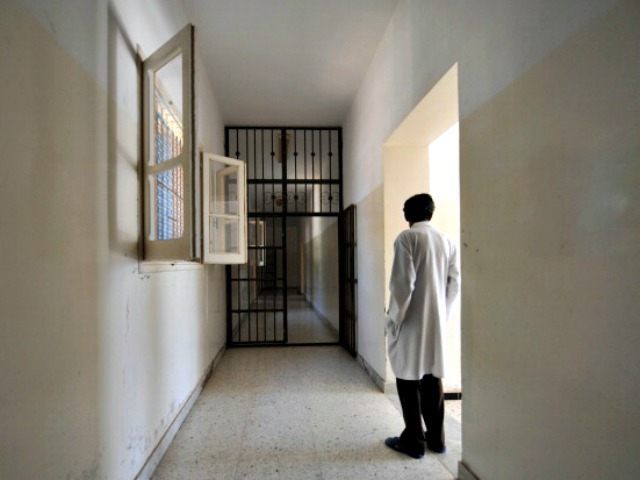As west Africa struggles to recover from an ongoing Ebola crisis and the continent’s poorest nations work to develop medical infrastructures, The New York Times warns that mental health treatment in much of nations like Togo and Ghana amounts to constraining patients with chains and taking them to spiritual consultants.
In an extensive report published this week, the Times tells the stories of multiple schizophrenia patients who awoke from psychotic episodes in extreme confusion, chained in a camp with others for whom their families could no longer provide. One man, Koffi Gbedjeha, said his fight with schizophrenia forced his family, which was once nearly entirely reliant on him, to intern him at a facility called Jesus Is the Solution, in which a pastor provided a location to chain patients and prayed continuously that their souls be freed of the curse within them. The report says more than 150 men and women are currently “patients” at the facility.
Gbedjeha’s family says they kidnapped him and forced him to attend the facility because he refused treatment from witch doctors and traditional herbalists, “so they suggested a compromise: Why not use his Christian faith in the service of recovery?”
The head of the camp, Pastor Paul Noumonvi, argued that his camp offers an alternative to more dangerous and less effective mental health methods. “Many of these people already have tried other things, like traditional healers, herbs and drugs, but the problem didn’t go away,” he told the Times. He argued that “witchcraft” is often the reason behind a person’s mental health decline, and that his camp specializes in breaking spells.
In a separate article, the Times tells the story of Rebecca Ajadogbil of Ghana, a woman who began to see visions of men chasing her as a teen. Instead of a prayer camp, her family opted for traditional “remedies” to mental illness. “I found her in the room there, painted with this herbal dye, tethered to a log… She was sitting on the floor. I came in and said, ‘What is this?’” said Michael Akankpienkum, a field officer for Presbyterian Community-Based Rehabilitation who was dispatched to send a nurse with schizophrenia medication upon hearing of Ajadogbil’s case.
Both Ajadogbil and Gbedjeha eventually found their way to medical experts who provided anti-psychotic medication. They have since improved, though both fear the day their families run out of the money to pay for the medication. The Times notes that, in addition to medication being expensive, mental health experts in west Africa are rare: “At last count, Liberia had just one practicing psychiatrist. Niger had three, Togo four and Benin seven. Sierra Leone had none.”
The United Nations and World Health Organization have called on developing nations to emphasize the need for mental health treatment in developing medical infrastructure, using October 10, known as World Mental Health Day, as the occasion. Some African governments have replied with declarations to do precisely that. The South African government, for example, issued a press statement this week following the WHO call for emphasis on mental health, warning communities who reject those suffering from mental illness:
Known as the ‘stepchildren’ of society, many individuals living with mental illnesses are often discriminated against, marginalised and abandoned by their family members or caregivers because of the stigma surrounding mental conditions. This rejection adversely impacts a mental health client’s self- respect, self worth and dignity of life.
The WHO Regional Director for Africa, Matshidiso Moeti, echoed the statements made by the organization:
The official recalled the crucial need to ensure that the dignity is preserved in all aspects of mental health, from the care to the patients to the attitudes of the public in general.
The Who official added that it is estimated that one in six people suffer from some form of mental disorder in African region.
The struggle to encourage locals to use professional doctors and not traditional healers to solve medical problems echoes a significant problem casting a shadow over the Ebola outbreak in west Africa. Last year, dozens are estimated to have died after exposure to traditional healers who advertised that they could cure Ebola and were significantly more trusted than medical experts working with international aid organizations like Doctors Without Borders. On many occasions, families kidnapped Ebola patients from hospitals to bring them to healers, contaminating anything they touched along the way. The problem was exacerbated by the widespread belief that the medical aid teams were not only unable to cure Ebola, but spreading it themselves as a form of population control.

COMMENTS
Please let us know if you're having issues with commenting.